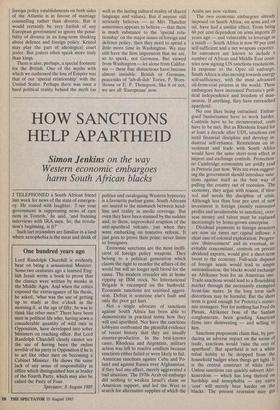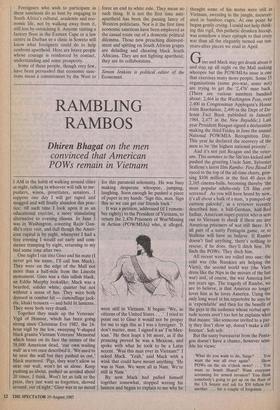HOW SANCTIONS HELP APARTHEID
Simon Jenkins on the way
Western economic embargoes harm South African blacks
I TELEPHONED a South African friend last week for news of the state of emergen- cy. He roared with laughter. 'I see your government is suppressing news of race riots in Toxteth,' he said, 'and banning interviews with IRA men. So, the revolu- tion's beginning, is it?'
Such tart rejoinders are familiar in a land where xenophobia is the meat and drink of politics and cataloguing Western hypocrisy is a favourite parlour game. South Africans are inured to the mismatch between head- line and reality in media coverage. But even they have been stunned by the sudden and, to them, unprovoked eruption of the anti-apartheid volcano, just when they were embarking on tentative reform. It just goes to prove their point: never listen to foreigners.
Economic sanctions are the most ineffi- cient of foreign policy weapons. They belong to a political generation which claims the right to reorder the affairs of the world but will no longer spill blood for the cause. The modern crusader sits at home ripping up IBM stock. No International Brigade is encamped on the bushveld. Economic sanctions are sanitised aggres- sion. Defeat is someone else's fault and only the poor get hurt.
Not a single advocate of sanctions against South Africa has been able to demonstrate in practical terms how they will end apartheid. Nor have the sanctions lobbyists confronted the plentiful evidence of recent history that they are usually counter-productive. In the best-known cases, Rhodesia and Argentina, military action was left to resolve conflicts because sanctions either failed or were likely to fail. American sanctions against Cuba and Po- land and against Russia over Afghanistan, if they had any effect, merely aggravated a bad situation. The 1970s Arab oil embargo did nothing to weaken Israel's claim on American support, and led the West to search for alternative supplies of which the Arabs are now victims.
The two economic embargoes already imposed on South Africa, on arms and on oil, have had a similar effect. From being 60 per cent dependent on arms imports 20 years ago — and vulnerable to leverage as a result — South Africa is now 90 per cent self-sufficient and a net weapons exporter. Its customers are known to include a number of African and Middle East coun- tries now signing UN sanctions resolutions. In response to the Opec oil embargo, South Africa is also moving towards energy self-sufficiency, with the most advanced oil-from-coal process in the world. These embargoes have increased Pretoria's poli- tical independence and freedom of man- oeuvre. If anything, they have entrenched apartheid.
No one likes being ostracised. Embar- goed businessmen have to work harder. Controls have to be circumvented, costs have to be met. But as Rhodesia found for at least a decade after UDI, sanctions can instil financial discipline and develop in- dustrial self-reliance. Restrictions on in- vestment and trade with South Africa would have the same short-term effect as import and exchange controls. Protection- ist Cambridge economists are avidly read in Pretoria just now. Wits are even suggest- ing the government should introduce sanc- tions against itself as the best way of pulling the country out of recession. The economy, they argue with reason, if bloa- ted and needs the discipline of crisis. Although less than four per cent of new investment is foreign (mostly reinvested profits and invulnerable to sanction), over- seas money and talent must be replaced increasingly by home-grown enterprise.
Dividend payments to foreign investors are now six times net capital inflows: a clear case of colonial exploitation. Progres- sive 'disinvestment' and its eventual, in- evitable concomitant, controls on private dividend exports, would give a short-term boost to the economy. Full-scale disposal of foreign assets would lead to simple nationalisation: the blacks would exchange an Afrikaner boss for an American one. Trade sanctions would lead to a flourishing market through the necessarily exempted front-line states. In the long term such distortions may be harmful. But the short term is good enough for Pretoria's econo- mic managers. Not for nothing has Fred du Plessis, Afrikaner boss of the Sanlam conglomerate, been goading American firms into disinvesting — and selling to him.
Sanctions proponents claim that, by pro- ducing an adverse impact on the terms of trade, sanctions would 'raise the cost of apartheid'. But apartheid is not a white tribal hobby to be dropped from the household budget when things get tight. It is the central construct of white rule. Unless sanctions can quickly subvert Afti- kanerdom — which has long thrived on hardship and xenophobia — any extra `cost' will merely bear harder on the blacks. The present recession may get deeper, though sanctions could discipline Pretoria to attack it. But the political consequences will be to push President Botha's existing tentative reform program- me onto the back burner.
Only the more sinister sanctions lob- byists could regard this as good news. To them, sanctions will undermine the gra- dualist programme, foster anarchy and white backlash and thus hasten 'necessary' revolution. Such naive Trotskyism makes a curious bedfellow with the advocacy of liberal democracy claimed by the anti- apartheid movement. But as even Mos- cow's ideologues have correctly decided, South Africa is far from being in a pre- revolutionary condition. It is not Iran. Except possibly in Zulu Natal, there is no alternative focus of authority to that of the white state. The most plausible threat is of a military coup by reformist white officers and that is hardly imminent. Certainly, sanctions might force the gov- ernment to become tougher, more corpor- atist and more interventionist. They might further embattle the Afrikaners and in- crease emigration among English-speaking whites. But they could equally restore Afrikaner unity and better arm it for survival. They will certainly make South Africa a more illiberal place, which is why many brave and sensible South Africans, including Mrs Helen Suzman and plenty of trade unionists (in private), are so against them. But illiberalism is part and parcel of African government these days. The last resort of the sanctions lobby is blatant neo-McCarthyism, that to oppose it is to appease apartheid. Yet what could be more appeasing than to advocate a barren and probably counterproductive aggres- sion? There is a role for sanctions in international affairs, but a strictly limited one. A recent survey by the American Institute for International Economics sug- gests that they are most effective when imposed for a specific, realisable policy objective, by a strong country against a weak but basically friendly one. The im- poser must have leverage, and the victim must have an interest in complying: inst- ances cited include America against the Dominican Republic in 1960 and America against South Korea in 1975. Years of strategic self-sufficency by South Africa have left the West little leverage over events south of the Zambesi. (Russia, with surrogate troops on the ground in Angola, probably has more.) Nonetheless, there is some evidence that an American threat to end its resumed military liaison with Pretoria last year secured a passport for Bishop Tutu and the release of some trade union detainees. A specific, deliverable decision was precipi- tated by a specific, deliverable sanction though President Botha was enraged when President Reagan claimed credit accord- ingly. By contrast, the much-vaunted sports boycott of South Africa lost all effectiveness when international sports bodies showed they could not deliver any reward to anti-apartheid steps within South Africa. The victim was left with no incen- tive to comply.
The sanctions now proposed by the UN and the American Congress meet none of these criteria. South Africa is told to show `measurable steps' towards ending apar- theid within 18 months, or experience further punishment. Yet the sanctions are puny (largely controls on financial transac- tions in America); the imposers are almost certainly unable to lift them in the near future; and the victim is given no guidance as to what compliance would be accept- able. Should President Botha merely re- peat the vague promises of reforin he made last January? Or must he resign and place a black man in his office? The threat is a pinprick against the implication to South Africa of conceding.
The likely course of events in South Africa is for the present bout of instability to end with the white government still in control and hundreds of blacks dead or in jail. The Nationalists will adjust apartheid to the need for economic retrenchment, toying with constitutional reform as and when the white electorate permits. Presi- dent Botha and his colleagues will experi- ence ferocious sanctions. But they will not emerge from the lunch tables of Washing- ton. They will be on Pretoria's own door- step: the sanction of a partly free press, a partly active parliament, partly effective trade unions and a black community riot- ing and striking in the townships. Foreigners who wish to participate in these sanctions do so best by engaging in South Africa's cultural, academic and eco- nomic life, not by walking away from it, still less by ostracising it. Anyone visiting a factory floor in the Eastern Cape or a law centre in Durban or a clinic in Soweto will know what foreigners could do to help confront apartheid. Here are brave people whose courage is reinforced by contact, understanding and some prosperity.
Some of these people, though very few, have been persuaded that economic sanc- tions mean a commitment by the West to force an end to white rule. They mean no such thing. It is not the first time anti- apartheid has been the passing fancy of Western politicians. Nor is it the first time economic sanctions have been employed as the casual route out of a domestic political dilemma. Those now preaching disinvest- ment and spitting on South African grapes are deluding and cheating black South Africans. They are not fighting apartheid; they are its collaborators.
Simon Jenkins is political editor of the Economist.












































 Previous page
Previous page